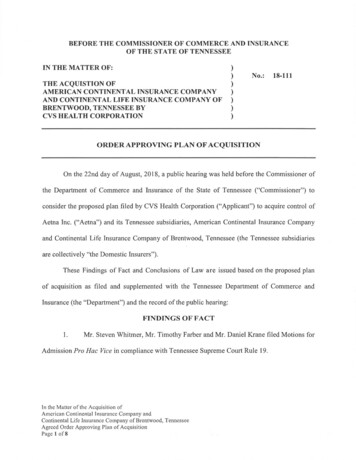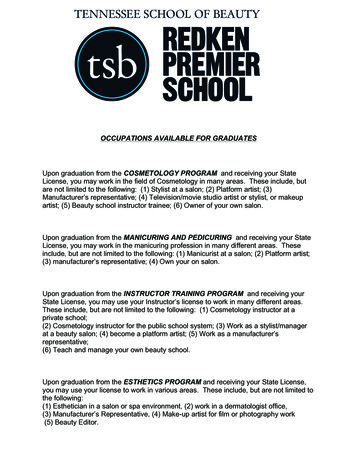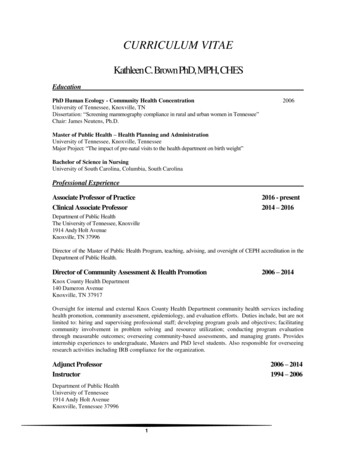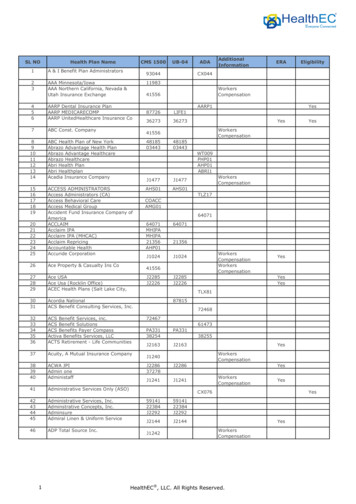
Transcription
Welcome to the Tennessee Smart Start Guide, a guide for small businessesand entrepreneurs, future and present.Small businesses make up the majority of all the companies in Tennesseeand are the backbone of our state’s economy. Some of the largest, most wellknown companies in Tennessee today began with small business ownerswho dared to dream big and worked hard.The challenges and obstacles that small business owners and entrepreneursface are often intimidating. Access to support and resources are crucial tonavigating the early days of a new venture and beyond.This guide is designed to support the successful growth and expansion ofsmall businesses and aspiring entrepreneurs. With one of the country’s bestbusiness climates, there’s no better place to start or grow a business than inTennessee and no better time than now.We invite you to explore the opportunities!tn.gov/ecd/bero
ABOUT THE GUIDEThe Tennessee Smart Start Guide is published by the Tennessee Departmentof Economic and Community Development (TNECD) Business EnterpriseResource Office (BERO) with the assistance of the marketing division. Theguide is published and distributed in hard copy and is available online fordownload at tn.gov/ecd/bero.ABOUT BEROThe Business Enterprise Resource Office (BERO) is housed within theDepartment of Economic and Community Development (TNECD). BEROserves as a voice for and advocate of economic inclusion for disadvantagedbusinesses (DBE); analyzes, disseminates and promotes best practices andaccess to capital to service providers; and reports on the status of DBEsstatewide. For more information, visit tn.gov/ecd/bero.ABOUT TNECDThe Tennessee Department of Economic and Community Developmentis passionate about developing dynamic, diverse economies and thrivingcommunities for generations of Tennesseans. To find out more,visit TNECD.com.
CONTENTSSELECTING A BUSINESS Purchasing an Existing Business Buying a Franchise Starting a New Business4 Tennessee Manufacturing ExtensionProgramBusiness Incubators andEntrepreneur CentersSETTING UP YOUR BUSINESS Sole Proprietorships Partnerships Corporations Limited Liability Company Relocating Your Business toTennessee10TAXES AND INSURANCE Local, State, and Federal Tax Franchise and Excise Tax Sales and Use Tax Tax-Based Incentives Insurance and Bonding Health InsuranceTHE BUSINESS PLAN Business Model Canvas vs.Traditional Business Plan Executive Summary Introduction Financial Projections Personal Financials The Marketing Plan Management Team18RESPONSIBILITIES ANDREGULATIONS Responsibilities Regulations EmployeesGETTING FUNDED Family, Friends, and Colleagues Credit Cards Commercial Credit Federal Government Loans State Government Loans Nontraditional Financing Small Business InvestmentCompanies Government Grants26BUSINESS ASSISTANCEAND TRAINING34 Business Enterprise Resource Office(BERO) Tennessee Small BusinessDevelopment Centers SCORE SBA Learning Center3848TARGETED BUSINESSAND ADDITIONAL TOPICS54 Home and Internet-BasedBusinesses Inventors Patents, Copyrights and Trademarks Technology-Based Businesses Veteran-Owned Businesses Government Contracting Business Owners with Disabilities Agri-tourism and Pick TN Products Exporting Regulatory AssistanceRESOURCES Resource ContactsCENTER PULL OUT Side 1: Resource Map Side 2: How to Start a Business,flowchart66
HANC ISEFRTINEXIS GNEWSELECTING ABUSINESS
For the starting entrepreneur, oneof the first decisions you will needto make is whether to purchase anexisting business, franchise or starta new business. There are uniquebenefits and concerns for eachoption; however, it is ultimately upto you to decide which course totake.PURCHASE AN EXISTING BUSINESSYou may save time and trouble bypurchasing an existing business. Ifyou are considering purchasing abusiness that is a sole proprietorshipor general partnership, you arebuying assets from the owner. Youwill need to obtain a new businesslicense for the existing businessfrom your county clerk office. Youare not assuming liabilities unlessyou specifically agree to it. Makesure all taxes that were due prior tothe purchase are paid or you may berequired to pay outstanding taxes.The advantages of buying a businessare avoidance of startup costs,usually little to no downtime inacquiring customers, establishedvendor relations and some kindof financial history on whichyou can base your decision. Thedisadvantages of buying a businessmay be the other side of theadvantages listed. There may befew customers to acquire, vendorrelations may be terrible because ofunpaid bills and the financial historymay not be as rosy as the ownerprojects.Once you have decided to purchasean existing business, there are afew steps to take. Decide what youwant the business to accomplish. Doyou want to make a living? Provideemployment for you, a spouse,children and their spouses? Locatean existing business that is for sale?Entrepreneurs may use businessbrokers to find businesses that arefor sale; chambers of commerce,and business advisors, such asattorneys and CPAs, may also knowof businesses for sale. Determinethe value of the business youplan to buy. This is as much art asscience. A business is valued byeither the worth of its assets, abilityto generate cash, the client base,earning ability or physical assetsonly. An analysis of the company’sprofit-and-loss statements fromthree years should help youdetermine trends, a rough cash flowand profitability of the business.Most entrepreneurs are compelledto seek outside financing to closethe deal. In these cases, mostlenders will require some ownerfinancing. This serves to reduce theirrisk as well as keep some ownerinvolvement or at least interestin the continued success of theventure.5
The bottom line is that after carefuland knowledgeable analysis, you canpurchase a business that can helpyou realize your dreams; however,without a careful and knowledgeableanalysis, the purchase can turninto a nightmare of bankruptcy andstrained relationships.BUYING A FRANCHISEA franchise is the right or licenseto sell the franchisor’s productsor services. The benefits of thefranchise industry are they offer apackage of assistance, marketingdata, proven products and/or services. Depending on thefranchise purchased, your riskmay be considerably less thanstarting a venture from scratch. Asuccessful franchise may offer aknown product or service, a certainlevel of demand and establishedpricing. Many franchisors performmarketing studies, including dataabout the target market, analysisof competitors’ products and6pricing, trends, estimated salesprojections, product design anddelivery. This gives you the benefitof a large corporate support stafffor minimum cost. On the otherhand, as the franchisee, you usuallypay an up-front fee plus periodicfranchise fees for corporateoverhead (management, advertising,etc.). A franchise may require you topurchase inventory from approvedvendors or from the corporateoffice exclusively. Some franchisorsrequire a minimum level of sales orprofitability for continuation of therelationship.When you are interested inpurchasing a franchise, you willneed to sign a contract with thefranchising company. The franchisecontract explains the conditionsof the relationship between thefranchisor and franchisee. Youmust make the initial contact eitherin writing or by phone. The objectof the initial contact is to obtainthe franchisor’s Uniform FranchiseOffering Circular (UFOC) or UniformFranchiser Disclosure Agreement.The UFOC will provide enoughinformation to enable you to makean informed decision. By law, theUFOC must meet the requirementsof the Federal Trade Commission’sFranchise Rule. The law also requiresthe UFOC be provided at the first“personal” meeting, 10 businessdays prior to signing a franchisecontract or 10 business days prior toany payments. In Tennessee, there
are no other disclosure documentsrequired; however, there areadditional laws governing packaging,alcoholic beverages and petroleumbased fuels (TCA 47-25). In addition,there are several laws coveringtermination of franchises.There are a couple of differentfranchising formats. BusinessFormat franchising includes ongoingoperational interface with thefranchise. Franchisees may purchaseinventory, trademark goods, takeadvantage of national or regionaladvertising, receive bookkeepingsupport and training assistancefrom the franchisor. Most fast foodfranchises fall into this category.The other type is Product and TradeName franchising which involvesbuying one product line for resaleand using the franchisor’s name.Automobile dealerships and retailservice stations fall under thiscategory.Talk with other franchise owners.They can provide invaluable insightinto their particular business andtheir view of franchisor support. Doyour research! There are severalsources of information on more than3,000 U.S. franchisors: Entrepreneurmagazine and Inc. magazine area good place to start. The FTCpublishes, A Consumer’s Guide toBuying a Franchise (ftc.gov).identify the franchise that is right forthem. These companies will do a lotof research for you and they haverelationships with many existingfranchisors. They can also assist youwith turning your existing businessinto a franchise model. Thesecompanies include Entrepreneur’sSource, FranNet and Fran Choice,among others. These companies willeither charge you or the franchisorsa fee for their services.The Entrepreneur’s Source helpsindividuals by educating, coachingand guiding them though franchiseownership. They charge a flatfee once you have identified thefranchising opportunity to pursue.Their initial services are provided atno cost.FranNet recommends franchiseopportunities, educates you onanticipated cost, financing optionsand training. FranNet offers theirinformation and services at nocharge, as they are paid by thefranchisor.Fran Choice guides you throughthe franchise search process bygathering information about yourexperiences and goals and developsa personalized model for use inevaluating franchise opportunities.There is no cost to use Fran Choiceservices or for the information.There are also franchise assistancecompanies that help individuals7
STARTING A NEW BUSINESSThe benefits of starting your ownbusiness include flexible hours,being your own boss, getting awayfrom a corporate setting and havingno limit to your income. Thetime and energy needed to runa startup business as well as thestress on family and finances area few concerns to consider beforestarting a new company. The “20Questions Before Starting” s/20-questions-starting) canbe used to determine if you areready to start your own business.Will you be working full-time orpart-time? A part-time home-basedbusiness can add income to increasethe household budget. Starting parttime enables you to learn valuablelessons in business management,especially time management.These lessons can function as astepping stone to running a full-timebusiness.As you enter this endeavor,recognize that the most importantingredient is you. Know yourpersonality, interests, abilities, drive,commitment, relationships, prioritiesand dreams. In addition, you shouldask yourself a few questions: doyou have the required experiencein marketing, pricing, financialprojections and bookkeeping?Remember, businesses, homebased or otherwise, do not operate8by producing goods or services.They operate by selling thosegoods and services at a profit. Theymake profits by controlling coststo produce goods and servicesat a lower cost than they sellthem. Does the business you arethinking of starting require learningnew skills? It may be harder todevelop skills on your own thanin a corporate setting that offerstraining as well as colleagues tohelp the learning process. There area variety of resources online or inperson.
CHAPTER NOTES9
SETTING UP YOURBUSINESS
Choosing the right legal structurefor your business will require thatyou contact an attorney, CPA ora business counselor. You needprofessional advice on the prosand cons of each legal structure.Legal structures include: SoleProprietorships, Partnerships,C Corporation, S Corporation (alsocalled Subchapter S Corporation),PBCs, Limited Liability Company orLimited Liability Partnership.SOLE PROPRIETORSHIPSThe majority of small businessesstart out as sole proprietorships.One person, usually the individualwho has day-to-day responsibilitiesfor running the business, ownsthe firm. Sole proprietors own allthe assets of the business and theprofits generated by it. They alsoassume complete responsibility forall of its liabilities. In the eyes of thelaw and the public, you are one inthe same with the business. Soleproprietorships pay less in taxesthan corporations. Net income fromthe business is regular income filedon the owner’s personal incometax return. Sole proprietors needa business license from the countyand/or municipality in which thebusiness operates.PARTNERSHIPSA general partnership is therelationship existing between twoor more persons who join to carryon a trade or business. Each personcontributes money, property, laboror skill and expects to share in theprofits and losses of the business.An example of a general partnershipis a husband and wife ownedbusiness. This type of partnershipis not a form of a corporation andcarries the same personal liability asa sole proprietorship.A general partnership must filean annual information returnto the IRS to report the income,deductions, gains, losses, etc., fromits operations; however, it does notpay income tax. Instead, it “passesthrough” any profits or losses to itspartners. Each partner includes hisor her share of the partnership’sincome or loss on his or her taxreturn.All partnerships should executea partnership agreement. Thepartnership agreement is acontract between the partnersof the business that detailsexpectations, contributions and theresponsibilities of each partner.Discuss future expectations withyour partner(s). Do they want togrow a company to operate or tosell short-term? How will profits bedistributed and what percentages?Each partner should contribute valueto the business and each partnermust recognize the value of theothers’ contributions. Determineahead of time who will contributecash, labor, industry experience11
and knowledge, sales leads, loansor guaranties. Responsibilities maydiffer from contributions, so be sureto define the partner’s individualresponsibilities as well as the groupresponsibilities. Clearly spell outwho can sign debt instruments forthe partnership, who determinescompensation or profit sharing,who handles the record keeping,who oversees recruitment to thepartnership, who can makeamendments to the partnershipagreement and also how thepartnership can be dissolved. In anycase, the partnership agreementshould be a written, notarizeddocument. A lawyer can draw up theagreement and act as a facilitator tocover points not previously included.There are examples of partnershipBASIC REQUIREMENTS FOR SCORPORATIONS INCLUDE: The company must be aDomestic Corporation withone class of stock Have no more than 100citizens or legal residentshareholders All your shareholders mustconsent to S Corporationstatus Use a permitted tax year Company must file IRSForm 255312agreements online at sos.tn.gov,sba.gov and score.org.CORPORATIONSIncorporation gives the business alegal existence separate from anindividual person. That is, it can ownassets and conduct business in itsown name. A business assumes acorporate identity when registeredor “incorporated” with the TennesseeSecretary of State. A corporationcan shield you and the stockholdersfrom personal liability from anylawful activities. Corporations payfederal taxes at a higher rate thansole proprietors. The corporationis liable for the state’s franchiseand excise tax. There are two basictypes of corporations, the C and SCorporations.C Corporations are standardcorporations that are primarilyused by large groups of investors.A few of the requirements to be acorporation include having a boardof directors and corporate officers,having stockholders as owners,holding regular board meetings,maintaining board minutes andapproving corporate resolutions.The corporation allows the boardto authorize certain actions suchas borrowing money, entering intocontracts and allocating corporateresources beyond routine businesstransactions. If your business is aneligible domestic corporation, youcan avoid double federal taxation
(paying taxes to the corporationand again to the shareholders) bycreating a S Corporation under therules of Subchapter S of the InternalRevenue Code. Under the laws ofTennessee, an S Corporation isincorporated; therefore, they aresubject to state franchise and excisetaxes. In this way, the S Corporationpasses its items of income, loss,deduction and credits through to itsshareholders to be included on theirseparate returns.In January 2016, the public benefitcorporation (PBC) became anoption for Tennessee businesses.The classification comes from thesocial entrepreneurship movementthat combines running a profitablebusiness with improving society. APBC is similar to a standard for-profitcorporation, but is managed in away that considers the public benefitpurpose(s) listed in its charter aswell as the financial interests of itsowners.If the company is incorporatedoutside of Tennessee, you arerequired to obtain a Certificateof Evidence to conduct businessoperations within Tennessee. TheCertificate of Evidence, TCA 48-11309, is evidence that out-of-statecorporations are in good standingin their state and are authorizedto conduct business in the state ofTennessee.LIMITED LIABILITY COMPANYLimited Liability Company (LLC) isa relatively new business structureallowed by state statute. An LLCcan be expensive to organize andrequires more administrative workthan other legal forms of business.LLCs are popular because, similar toa corporation, owners have limitedpersonal liability for the debts andactions of the LLC. Other featuresof LLCs are more like a partnership,providing management flexibilityand the benefit of passthroughtaxation. Owners of an LLC are calledmembers. Since most states do notrestrict ownership, members mayinclude individuals, corporations,other LLCs and foreign entities(businesses outside of Tennessee).There is no maximum number ofmembers. Most states also permit“single member” LLCs, those havingonly one owner. A few types ofbusinesses generally cannot beLLCs, such as banks and insurance13
companies. There are special rulesfor foreign LLCs.The Tennessee Bar Association (TBA)will guide you to a legal referralservice and help you determineif you would qualify for free legalservice. For more information, visittba.org/access-to-justice.The Tennessee Society of CertifiedPublic Accountants (TSCPA) is thestate professional organizationfor certified public accountants.TSCPA can help businesses find aCertified Public Accountant (CPA)to assist with the startup andrunning of the business. TSCPAalso has an online Small BusinessResource Center. The Small BusinessResource Center’s mission is toeducate, provide information andresources that would assist smallbusiness enterprises. This and moreinformation can be found online attncpa.org.FOREIGN-OWNED (OUT-OF-STATE)CORPORATIONSThe state of Tennessee recognizesbusinesses incorporated outsideof Tennessee as foreign-owned (orout-of-state) corporations. Whenyou relocate your business toTennessee, you will need to decideif you will operate your businessas a foreign-owned businessor establish your business as aTennessee corporation. Foreignowned businesses pay a one time14 600 fee and a 20 annual fee tothe Tennessee Secretary of State.You will need to fill out applicationform ss-4429 for corporations andapplication form ss-4236 for an LLC.These forms can be found online attn.gov/sos. A letter of good standingfrom your original state needsto accompany your application.Typically, remaining a foreignowned business is beneficial only ifyou plan to continue operations inyour original state. A trusted CPAcan advise you on the specific taxliabilities for your business.REQUIREMENTS FOR AN LLCINCLUDE: Membership fee is dueannually LLC fees range from 300 3,000 An annual report filed withthe Secretary of State Financial records preparedfor any member requestingthem Board minutes recorded andmaintained Memberships sold onlywhen all the members agreeto the transaction
If you plan to cease operations inthe state you are moving from, youshould register your business withthe Tennessee Secretary of Stateas a Tennessee corporation. Youcan register your new corporation attnbear.tn.gov/Ecommerce. Certainregistrations can be filed and paidfor online, but others will requirethat documents be printed andmailed. In addition to registeringyour corporation with the TennesseeSecretary of State, you will alsoneed to register with the Tennesseedepartments of Revenue and Laborand Workforce Development.You will most likely need to obtainlocal business licenses throughthe county clerk office wherethe business will be located inTennessee. If you are in a regulatedindustry such as general contracting,that requires specific licenses,check with the regulatory agencywho licenses you to see if they havea reciprocal agreement with thestate of Tennessee to transfer yourlicense.bank account, applying for businesslicenses and filing a tax return bymail.You can register for your FEIN onlineat irs.gov or by calling1-800-829-4933. All corporationsand partnerships are required tohave an FEIN.ADVANTAGES OF TENNESSEEThere are many benefits torelocating your business toTennessee. Tennessee fosters a probusiness climate that gives accessto vital economic components, suchas a right-to-work environment, adependable and educated workforceand a wealth of technologyresources that provide opportunityfor business growth and profitability.In addition, Tennessee offers areasonable cost of living and doesnot impose a personal state incometax or a state property tax.FEINIf you do not want to use yoursocial security number to identifyyour business, you are requiredto obtain a Federal EmployerIdentification Number (FEIN) fromthe IRS. The FEIN is your business’spermanent identification numberand can be used for most of yourbusiness needs such as opening a15
Tennessee compares favorably withthe cost of living in other states. Infact, its eleven largest cities rankbelow the national average forcost of living and housing costs areamong the lowest in the nation.Tennessee enjoys a generallymild climate, providing favorableconditions and a minimum ofweather related disruptions.Tennessee borders eight states andis within a day’s drive of 75 percentof the U.S. population.Tennessee has a strongentrepreneurial climate. Recently,a national study ranked Tennesseeas having the fourth highestentrepreneurial activity rate in thenation. The state of Tennesseesupports small businesses andentrepreneurs with a low businesstax burden, lower cost of living, anonline business registration system,access to nontraditional financingand a diverse, robust economy withclose proximity to three-quarters ofthe U.S. population.RELOCATING YOUR FAMILYThe state of Tennessee providesinformation at tn.gov with helpfullinks and information on becominga legal resident in Tennessee. Thereare also resources to help youfamiliarize yourself with Tennessee’scommunities, neighborhoods andeducation systems.16
CHAPTER NOTES17
A key ingredient in every businessis a plan. If you have a new ideaand don’t need to have a traditionalbusiness plan for securing funding,you could use a business modelcanvas.What’s the difference? Detail. It’s alsoa dynamic versus static approach.The traditional plan tends to usemore static information, whereasthe business model canvas gives youa dynamic, visual structure that youcan be adjust. Both versions serve apurpose.If your business is in a well-definedindustry and your landlord asked forone before signing the lease then atraditional plan is the better option.If your business is creative field orin a quickly shifting arena then thebusiness canvas model may serve toget started quicker.The traditional business plan maybe needed when you look forfinancing. It also helps establisha clear direction for your business.This document is not meant to bewritten and then stashed in a filecabinet. Most experts say thebusiness plan should be reviewedannually and revised to account forthe economic environment. Thetime frame depends on how fastor slow your business grows and iscompletely up to you.Look at the business plan as aliving entity that changes as thecompany grows and reaches certainmilestones.The business plan usually containsan executive summary, introduction,financial projections, personalfinancials, marketing plan, and theresumes of the management team.As part of its training program,CO.STARTERS uses its own visualcanvas model. It asks clear questionsto move you through the step bystep of the why and how thebusiness will work(costarters.co).THE BUSINESS PLANCONTAINS: Executive SummaryIntroductionMarketing PlanManagement Team ResumesFinancial ProjectionsPersonal FinancialsBusiness plan templates, includingfinancial projections, are availableonline at:tsbdc.orgscore.orgsba.govNext page: Canvas model credit: Co.Starters19
CUSTOMERPROBLEMWHO DO YOU SERVE?WHAT IS THE PROBLEM YOURCUSTOMER HAS?ALTERNATIVESHOW IS YOUR CUSTOMERCURRENTLY SOLVING THE PROBLEM?WHAT ARE THE ALTERNATIVE SOLUTIONSTO THE PROBLEM? WHAT’S THECOMPETITION?SOLUTIONWHAT DO YOU OFFER YOUR CUSTOMER?WHAT DOES YOUR CUSTOMER GET?STARTUP NEEDSWHAT ARE YOUR ONE-TIME NEEDS TO GET STARTED (MONEY,PEOPLE, THINGS, TECHNOLOGY, ACTIVITIES) ?20
MESSAGEREVENUEWHAT IS YOUR STORY?HOW DOES YOUR CUSTOMER HEAR IT?HOW DO YOU MAKE MONEY FROMYOUR CUSTOMER?DISTRIBUTIONHOW DOES YOUR PRODUCT ORSERVICEGET TO YOUR CUSTOMER?BENEFITWHY DOES YOUR CUSTOMER WANTYOUR PRODUCT ORSERVICE? HOW DO YOU SOLVE THEPROBLEM?ADVANTAGEWHAT GIVES YOU THE EDGE OVER THE ALTERNATIVES?WHY ARE YOU THE BEST PERSON TO DO THIS?COSTSWHAT ONGOING NEEDS ARE ESSENTIAL TOKEEP YOU GOING (MONEY, PEOPLE, THINGS,TECHNOLOGY, ACTIVITIES) ?21
THE MARKETING PLANTHE BUSINESS PLANEXECUTIVE SUMMARYThe executive summary is the firstpage of the business plan. Writeit last. This summary is yourfirst selling point followed by yourfinancial projections when trying toget financing. If you’re looking fora loan, include the amount you’reasking for, purpose and how theloan will be paid back.INTRODUCTIONIn this section, you include thedetails of your business:a description of the company’soperations, primary market,background and eventual goals.Explain the company structure,legal structure (sole ownership,partnership, corporation or limitedliability) and business location.Include product and/or serviceand identify your company orentrepreneur name. This sectionshould be two to three sentences.22This is one of the crucial aspectsof your business plan. In thissection, you’ll include a marketanalysis, identify competitors,your target market and amarketing plan. You want to provideinformation on the economicenvironment to tell how well theindustry is performing versus theeconomy as a whole. In addition,it should review business practicesthat may be unique to the industry.It describes competitors who mayaffect the success of your businessand identifies pricing or technicalinnovation strategies that giveit a competitive advantage.Include anyone that makes oroffers a product or service that iscomparable to yours. You’ll definethe specific customer you target, andthis section contains valuable dataabout their expectations. In addition,you will include data on purchasingdollars spent, road and foot trafficaround the business location andexpected gain in market share.The marketing plan also details thehow, when and where of youradvertisements. This is importantto show how you’ll inform customersabout your product and/or service.MANAGEMENT TEAMThis section should include thename, physical and email addresses,phone number, and relevant work
or industry experience for eachmember. The purpose of this sectionis to acquaint loan officers with theteam’s industry experience anddemonstrate their ability to operatea company. The resumes shouldoutline skills and experiencesthat facilitate the operation of acompany, and answer several keyquestions: Who is going to run thedaily operations? And balance thebooks? And market and sell? Whois your attorney? Having the team’sroles and responsibilities on paperbenefits everyone because theyknow their duties. In this section youmay include an advisory board thatsupports your company in an area(s)where your team lacks experience.FINANCIAL PROJECTIONSThe financial portion of the businessplan consists of documents thatsupport loan requests and indicatethe expected financial position ofthe company at different periods.This is the area where you should berealistic and conservative. Listthe amount of money the companyhas spent or is prepared to spend onthe business venture. This documentshould include all funds raised, theirsources (owner’s cash,loans from friends or investors)and how they’ll be used.Common documents foundin financial projections include anoperating expense report, cashflow statement, balance sheet andincome statement.Entrepreneurs say the mostcommon mistake in starting abusiness is underestimating startupcosts and the time required togenerate positive cash flow. Startupcosts are ether fixed or variablecosts. Examples, sometimesreferred to as overhead, are thepurchase or lease of equipment,supplies, utility deposits, furniture,fixtures and vehicles, real estaterent or mortgage. They will be thesame regardless of the volumeof business generated. Variablecosts such as payroll, inventory,utility bills, production waste costs,unanticipated production costsand underestimated job quotesare associated with the volume ofoperatio
STARTING A NEW BUSINESS The benefits of starting your own business include flexible hours, being your own boss, getting away from a corporate setting and having no limit to your income. The time and energy needed to run a startup business as well as the stress on family and finances are











